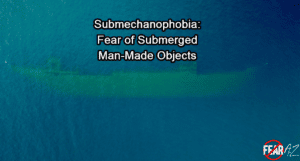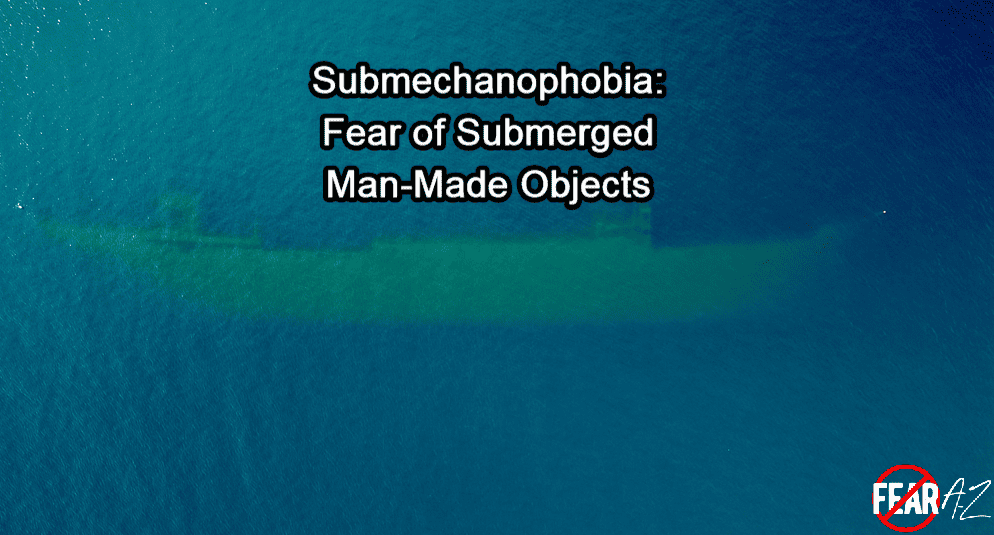Share This Article
Let’s Dive into Submechanophobia
Submechanophobia, also known as the fear of submerged man-made objects, is a unique and lesser-known phobia that affects people in various ways. It can cause intense and irrational anxiety when encountering or even thinking about structures like ships, submarines, planes, cars, or statues submerged beneath the water’s surface.
While it may sound unusual, this fear can be distressing for those who experience it. Read on as we explore submechanophobia, its symptoms, possible causes, and treatments.

Understanding Submechanophobia
Do large dark objects looming beneath the water’s surface cause a sense of panic and dread? Do structures such as old docks, large boats or even large trees make you feel the need to move away? Do you perhaps keep the fear to yourself? In many cases, this fear may be natural.
Fearing large unknown structures underwater may be part of our fight or flight response. We may not know if the item is a living being, something that may rush to the surface and cause you harm. But sometimes this fear goes beyond a normal response. Sometimes it can take over our thoughts and disrupt our daily lives.
You might wonder how common submechanophobia is, but it’s challenging to provide those statistics. Many individuals may not even realize they have this specific fear. Often, people associate their anxious feelings with other fears such as that of deep water or drowning, rather than recognizing the underlying cause. Learning the true basis of your fear is important as you begin your journey to overcome it.
Potential Causes of Submechanophobia
The exact causes of submechanophobia remain largely unknown, but experts suggest several factors that may contribute to the development of this fear. These potential causes can vary from person to person, and a combination of them may play a role.
Past Traumatic Experiences
One possible cause is past traumatic experiences related to submerged objects. For some individuals, a distressing encounter with a submerged object in their childhood or witnessing an accident involving such objects can create a lasting association between these objects and fear.
Exposure to Underwater Accidents
Another factor could be exposure to underwater accidents, either in real life or through the media. Viewing or hearing about incidents involving submerged objects can contribute to the development of submechanophobia, as it reinforces the idea that these objects may pose hidden dangers.
Fear of the Unknown
Psychologists theorize that submechanophobia may be linked to a general fear of the unknown. Submerged objects hidden beneath the water’s surface often evoke a sense of mystery and uncertainty. The fear may arise from the imagination filling in the gaps about what might be lurking beneath, feeding the anxiety.
Evolutionary Instincts
It’s also possible that submechanophobia has roots in our evolutionary past. As humans evolved near water sources for survival, our ancestors may have developed an innate sense of caution around unfamiliar objects in water as a means of self-preservation.
Individual Differences
Additionally, individual differences in personality, genetics, and life experiences may contribute to the development of submechanophobia. What triggers this fear in one person may not affect another in the same way.
While these factors offer insights into the potential causes of submechanophobia, each person’s experience with this fear is unique. Some individuals may identify with one or more of these factors, while others may not. Understanding the possible causes can provide valuable insight into the nature of submechanophobia and may help individuals explore effective ways to address and overcome their fears.
How to Overcome Submechanophobia – Treatment Options
Overcoming submechanophobia is a unique journey for each individual, but there are various self-help techniques to explore. Gradual exposure therapy is a common approach, where individuals gradually expose themselves to images or videos of submerged objects to build tolerance and reduce anxiety levels over time. Breathing exercises, meditation, and visualization techniques can also help manage anxiety symptoms associated with submechanophobia.
For those with severe submechanophobia, seeking professional help from a therapist or counselor who specializes in phobias may be beneficial. Therapists can offer guidance and support through cognitive-behavioral therapy (CBT) or other evidence-based treatments tailored to your needs.
Self-Help for Submechanophobia
Educate Yourself
Learn about submechanophobia to better understand your fear and realize you are not alone in experiencing it.
Gradual Exposure Therapy
Try gradual exposure therapy to manage your fear. Start with less anxiety-inducing situations like looking at pictures or videos of submerged objects. Gradually progress to more challenging scenarios, such as visiting a swimming pool or aquarium.
Mindfulness Techniques
Use mindfulness techniques to reduce anxiety and increase relaxation. Focus on the present moment, practice deep breathing exercises, and engage in relaxation methods like meditation or yoga.
Seek Support
Reach out to friends, family, or support groups who understand your fear. Sharing your concerns and experiences with others who have faced similar situations can be comforting and offer valuable insights.
Understand that overcoming submechanophobia takes time and patience, and progress may vary from person to person. Utilizing self-help strategies and seeking appropriate support when needed can lead to conquering your fear and living a more fulfilling life.
Professional Help for Submechanophobia
Seek professional help if submechanophobia significantly affects your daily life. Consider assistance from mental health professionals who specialize in anxiety disorders or specific phobias like submechanophobia. These therapists can guide you through evidence-based therapies to help you overcome your fears. Here are some professional therapies to consider:
Cognitive-Behavioral Therapy (CBT)
CBT is a common treatment for phobias, including submechanophobia. It involves working with your therapist to challenge negative thought patterns related to submerged man-made objects and gradually exposing yourself to feared situations in a controlled manner.
Relaxation Techniques
Therapists may use relaxation techniques such as deep breathing exercises and mindfulness practices to help manage anxiety symptoms associated with submechanophobia.
Reframing Strategies
Therapists can teach you strategies to reframe your thoughts and emotions regarding submerged objects, promoting a more balanced perspective.
And remember, there’s no shame in seeking help. Such action is a positive step toward your better well-being. Qualified experts can guide you in overcoming this fear and regaining control of your life.
Living with Submechanophobia
Living with submechanophobia can be challenging, because it involves constant fear and anxiety triggered by submerged man-made objects. However, you are not alone. Online forums and support groups offer a sense of solidarity and guidance. Self-help strategies and professional assistance can help individuals manage and overcome this fear.
In Conclusion
Submechanophobia is a relatively common phobia that can cause significant distress. Its symptoms vary from person to person and can include physical and psychological reactions. While the exact causes remain uncertain, understanding the potential factors can aid in overcoming this fear. Self-help techniques and professional therapy are valuable tools for managing submechanophobia, and with time and patience, it’s possible to reclaim control over your fear and lead a more fulfilling life.



